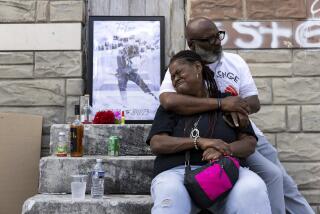Len Bias’ Brother Joins Cycle of Sorrow
- Share via
We sat inches apart on a cold bench inside a junior high school auditorium on Chicago’s Westside last year. She had just delivered a moving but all-too-familiar speech--part of her personal crusade against drugs and their devastating consequences.
Stately, elegant and full of grace, Lonise Bias was intimate with sorrow. She shared with me her pain and many sleepless nights since cocaine had killed Len, her eldest son, four years before.
Her tears flowed uncontrollably, and her pain was nearly more than I could bear.
She had named him Leonard, but headline writers soon shortened that to Len. The Boston Celtics made him the No. 1 pick in the National Basketball Assn. draft in 1986. He would have been an instant millionaire. But the 22-year-old collapsed in his University of Maryland dorm room after snorting cocaine, only weeks before he was due at the Celtics camp.
Moments from my interview with Lonise Bias have flashed in my mind in the year and half that has passed. But she has been very much with me since last week, with the news that another of her sons, Jay, 20, is dead.
He was shot to death in front of a jewelry store in a small Maryland town outside Washington after an apparent argument with another man over a woman.
The news took my heart and thoughts back to that gymnasium and to a woman trying to build futures for others from her sorrow. Now she has lost two sons to the harsh realities of urban America.
I have tears for Lonise Bias, her sons and the thousands of other African-American families who are losing their male children at horrifying rates.
And I feel for a country that seems content to stand by and watch.
Recent studies show that 42% of all deaths of male African-Americans ages 15 to 24 are from homicides, and drugs often play a prominent role. In California, the murder rate jumps to 54.2%, and the figures show no signs of coming down soon.
Carnage has become that common in the streets of our nation’s capital and in the alleys of New York or Chicago or Detroit.
For now.
The Rev. John McReynolds of the Second Baptist Church in Santa Ana, one of the largest African-American congregations in Orange County, stressed that it is just a matter time before the bloodshed hits America’s suburbs.
“I think America needs to stop looking at this as just a black problem, because it’s more than that,” McReynolds said. “Wherever there is a black population in America, young black men face the same type of hopelessness and frustration.
“Orange County is no different,” he said, “because America’s views toward the black male are the same from the streets of South-Central Los Angeles to the hills of Laguna.”
Though most of us see these grim statistics only in news reports, mothers such as Lonise Bias negotiate their grief day after day, son after snuffed-out son.
And what does a mother of a little black man-child tell him as she prepares for what rap artist Young MC calls a “futureless future”? What can one tell a group of young black men who realize early on that the odds are against them ever reaching age 25?
Do you recite Jesse Jackson’s slogan, “Keep Hope Alive”? Or should you counsel them to embrace their dreams, as Dr. Martin Luther King Jr. did?
Hope burned brightly for Len and Jay Bias. They both had dreams. And they both are dead. They dreamed the American dream, but it is a reality still far beyond the reach of a large majority of African-Americans.
So, “What happens to a Dream Deferred?” asked African-American poet Langston Hughes.
Does it dry up like a raisin in the sun
or fester like a sore
and then run?
Does it stink like rotten meat
or crust and sugar over
like syrupy sweet?
Maybe it just sags
like a heavy load or does it explode?
Hughes asked that question nearly 40 years ago. For too many black youths, the answer has become a loaded needle, a loaded gun and a shortened life.
More to Read
Go beyond the scoreboard
Get the latest on L.A.'s teams in the daily Sports Report newsletter.
You may occasionally receive promotional content from the Los Angeles Times.










